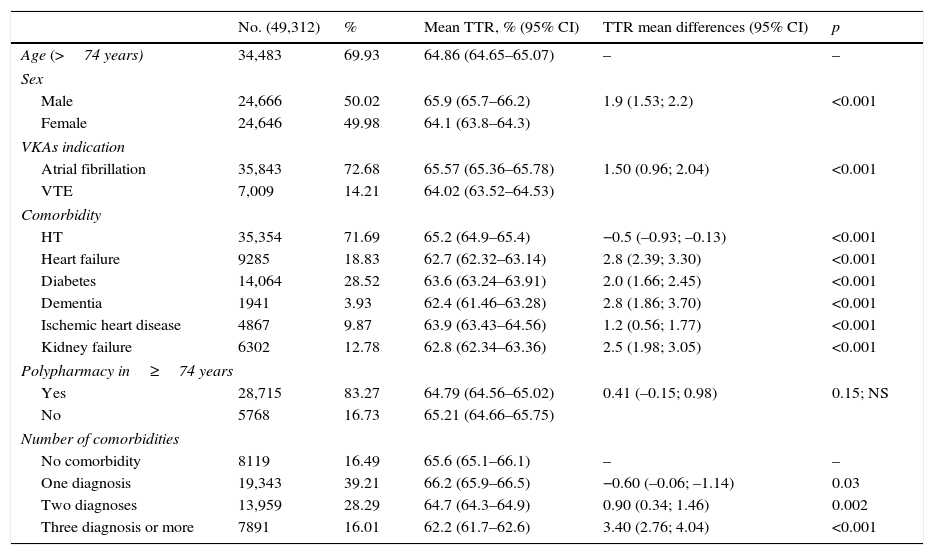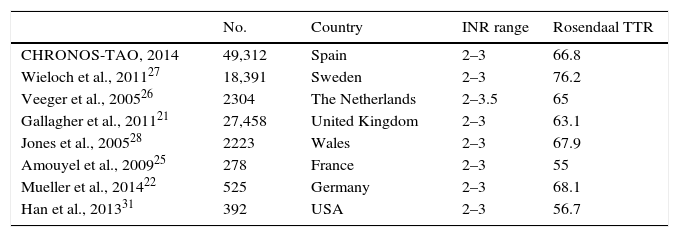To determine quality control of patients with oral anticoagulant treatment recruited in Primary Care (PC) using the Rosendaal method to estimate time in therapeutic range (TTR) and comparing it with fraction of international normalized ratio (INR) in range and cross-sectional analysis (last INR registred).
Material and methodA retrospective observational study based on electronic medical record in routine clinical practice. Setting: PC centers (262) in Madrid. We included all patients with acenocumarol treatment, with an INR therapeutic range established between 2 and 3. We excluded patients with valvular pathology and disrupted clinical follow up in PC (<3 INR determinations in the studied period, a period of >90 days or ≥3 periods of >60 days between 2 determinations). The final population was 49,312 patients. The variables considered were all INR values and their respective dates. TTR was calculated by the 3 methods above mentioned. We considered “therapeutic range” INR between 2 and 3 and “adjusted range” INR between 1.8 and 3.2. Optimal control for each patient was considered TTR>60%.
ResultsBy using Rosendaal method, TTR was 66.8% (81.7% adjusted), with a percentage of total INR in range was 58.8% (66.5% adjusted), and, with the cross-sectional analysis, it was 70.5% (76.8% adjusted). Mean TTR was 65% (standard deviation 20.3), and the percentage of patients with TTR>60% was 63.3% (88.1% adjusted).
ConclusionThe quality control of patients with oral anticoagulants in PC in Madrid is acceptable, similar or higher to other studies and pivotal trials of new anticoagulants. Compared to the Rosendaal method, total fraction of INR underestimates quality control, and cross-sectional analysis slightly overestimates it.
Conocer el grado de control de los pacientes en tratamiento con anticoagulantes orales atendidos en Atención Primaria (AP) estimando el tiempo en rango terapéutico (TRT) según el método de Rosendaal, y compararlo con el porcentaje de international normalized ratio (INR, «razón normalizada internacional») en rango y el análisis transversal (última INR).
Material y métodoEstudio observacional retrospectivo con datos de la historia clínica electrónica de todos los centros de AP (n=262) de la Comunidad de Madrid. Se incluyeron todos los pacientes en tratamiento con acenocumarol con rango terapéutico de INR entre 2 y 3. Se excluyeron los pacientes con valvulopatías y aquellos con seguimiento discontinuo (<3 determinaciones de INR, período de>90 días o≥3 períodos de>60 días entre 2 determinaciones). La población final fue de 49.312. Las variables consideradas fueron todos los valores de INR y sus fechas respectivas. Se calculó el TRT por los 3 métodos referidos, considerando «rango terapéutico» valores de INR entre 2–3, y rango «ajustado» valores de INR entre 1,8–3,2. Consideramos «control óptimo» en cada paciente si el TRT>60%.
ResultadosEl TRT por el método de Rosendaal fue del 66,8% (81,7% ajustado), el porcentaje de INR en rango, del 58,8% (66,5% ajustado), y el análisis transversal, del 70,5% (76,8% ajustado). La media (desviación estándar) de los TRT por paciente fue del 65% (20,3), y el porcentaje de pacientes con un TRT>60% fue del 63,3% (88,1% ajustado).
ConclusiónEl grado de control de los pacientes anticoagulados en AP es aceptable, similar o superior respecto a otros estudios y a los ensayos pivotales de nuevos anticoagulantes. Comparados con el método de Rosendaal, el porcentaje total de INR infraestima el grado de control, y el análisis transversal lo sobrestima ligeramente.









